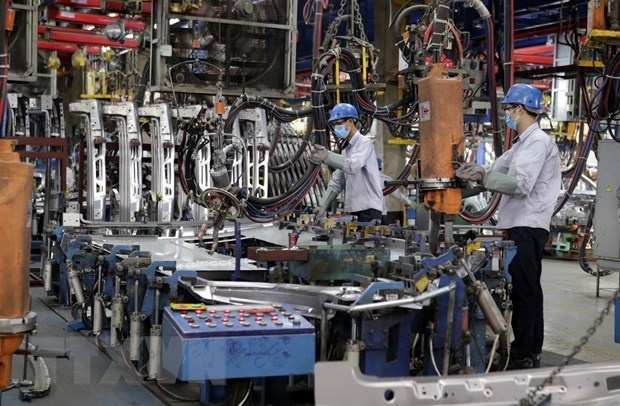Vietnam remains strong candidate for foreign investment
 |
| Illustrative image (Photo: VNA) |
Hanoi - With a vibrant economic climate, Vietnam remains a strong candidate for investment from the Association of Southeast Asian Nations (ASEAN) and beyond, according to the Vietnam Briefing newswire.
FTAs and RCEP
The newswire said Vietnam’s free trade agreements (FTAs) are another pull factor that investors can bank on. Vietnam has used its participation in FTAs as an instrument to ensure increased economic power and financial security. This will ensure that Vietnam’s economic development will continue to shift away from exporting low-tech manufacturing products and primary goods to more complex hi-tech goods like electronics, machinery, vehicles, and medical devices. The implementation of the EU-Vietnam FTA (EVFTA) last year is an example of this.
The Regional Comprehensive Economic Partnership (RCEP), which officially came into force on January 1, 2022, will reduce tariffs and set trade rules and help link supply chains, particularly as governments grapple with COVID-19 effects.
As Vietnam moves to become a high-tech manufacturer, the RCEP can help local firms increase exports and attract high-quality goods for its consumers. In addition, with the demand for Vietnam’s exports like agriculture and fisheries products, Vietnam is set to benefit, it said.
Mergers and acquisitions
According to Vietnam Briefing, mergers and acquisitions (M&A) are likely to continue to play a key role in Vietnam’s economy in 2022. While in 2020, M&A activities were disrupted due to the pandemic, in the first nine months of 2021, M&A deals with combined disclosed value have already totaled 3 billion USD. Domestic firms have led the M&A market. The government has also eased some requirements in the investment and enterprise laws to facilitate M&A deals. As Vietnam hopes to recover its economy, further robust M&A activities can be expected in 2022.
Government support packages
Due to the pandemic, the government unveiled several support packages for businesses and individuals to help spur the economy. Businesses should prepare for 2022, using these government measures to improve cash flow.
For example, Vietnam issued the Resolution No. 406 which included a 30 percent corporate income tax cut, which was applied to all businesses that had revenue of less than 200 billion VND (8.8 million USD) in 2021. Further support measures were issued in the form of land rent reduction, social insurance, unemployment insurance benefits, and one-time payments.
Foreign employee work permits
After tightening requirements on foreign employees as per Decree 152 which was issued earlier in the year, the government issued Resolution 105 easing requirements of issuing and renewing work permits. Mainly, as per the resolution, the education degree does not have to be related to the job position in Vietnam, and that the work experience in Vietnam can be counted rather than the work experience from the home country. The easing of requirements should help businesses and employees enter Vietnam for job opportunities along with the easing of entry procedures from next year.
Tourism
The Vietnamese government is also developing a roadmap to fully open up to international visitors by June 2022. The plan has already begun to be implemented with fully vaccinated international tourists arriving to Phu Quoc, Hoi An, and Nha Trang on packaged tours. The Ministry of Culture, Sports, and Tourism has proposed that the Prime Minister consider restoring visa exemption for tourists who stay in Vietnam for less than 15 days. In addition, nine international flight routes have been given the green light to resume commercial flights.
Heading into 2022
2021 brought significant challenges for many businesses in Vietnam. Several issues that Vietnam faced in 2021 are likely to continue into 2022. Nevertheless, the newswire said a more targeted and focused development in key areas will present more opportunities for growth, particularly in areas that help prop up Vietnam’s bottom line of economic stability and people’s livelihoods.
Vietnam’s economic restricting plan for the 2021-2025 period, approved by the National Assembly, focuses on the digital economy, hi-tech industries, urban economy, strengthening regional connectivity and the role of key economic zones, and restructuring to achieve a green and sustainable economy, among others.
While Vietnam has suffered, its economy is on course to record positive growth in 2022. Given its investor-friendly policies, relative economic and political stability, cost efficiency, and consumer demand prospects, Vietnam is likely to continue gaining from supply chain restructuring in Asia in addition to attracting a new range of investors, it concluded.
What the stars mean:
★ Poor ★ ★ Promising ★★★ Good ★★★★ Very good ★★★★★ Exceptional
Related Contents
Latest News
More News
- Hermes joins Long Thanh cargo terminal development (February 04, 2026 | 15:59)
- SCG enhances production and distribution in Vietnam (February 04, 2026 | 08:00)
- UNIVACCO strengthens Asia expansion with Vietnam facility (February 03, 2026 | 08:00)
- Cai Mep Ha Port project wins approval with $1.95bn investment (February 02, 2026 | 16:17)
- Repositioning Vietnam in Asia’s manufacturing race (February 02, 2026 | 16:00)
- Manufacturing growth remains solid in early 2026 (February 02, 2026 | 15:28)
- Navigating venture capital trends across the continent (February 02, 2026 | 14:00)
- Motivations to achieve high growth (February 02, 2026 | 11:00)
- Capacity and regulations among British areas of expertise in IFCs (February 02, 2026 | 09:09)
- Transition underway in German investment across Vietnam (February 02, 2026 | 08:00)

 Tag:
Tag:


















 Mobile Version
Mobile Version